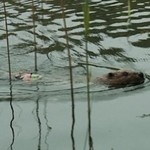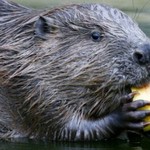Three families of European beavers were released in a Scottish forest today nearly five centuries after the species was hunted to extinction.
It comes a year after the Scottish Wildlife Trust and the Royal Zoological Society of Scotland were given the go-ahead for the controversial trial reintroduction.
Opponents fear that beavers could damage stocks of salmon and other fish, threatening angling which is worth L100million annually to the Scottish economy.
But the 11 beavers, fitted with tracking devices, are not being released in salmon rivers.
 The beavers have been tested continually through their quarantine to make sure they are free of bacteria such as giardia and cryptosporidium - 'food poisoning bugs' which can affect humans.
The beavers have been tested continually through their quarantine to make sure they are free of bacteria such as giardia and cryptosporidium - 'food poisoning bugs' which can affect humans. Scottish Natural Heritage (SNH) will monitor the trial at a cost of L275,000 and will report to ministers on the outcome.
The three families have been placed in artificial lodges around the forest until they can build ones for themselves.
Conservationists hope the beavers will boost tourism, but say it will be too early to come and see them for several months because they will not have settled in yet.
The European beavers - Latin name Castor fiber - are believed to be the closest relatives of those that once inhabited Britain's rivers and lakes, and this is the first time a native mammal species has been formally reintroduced into the wild.




